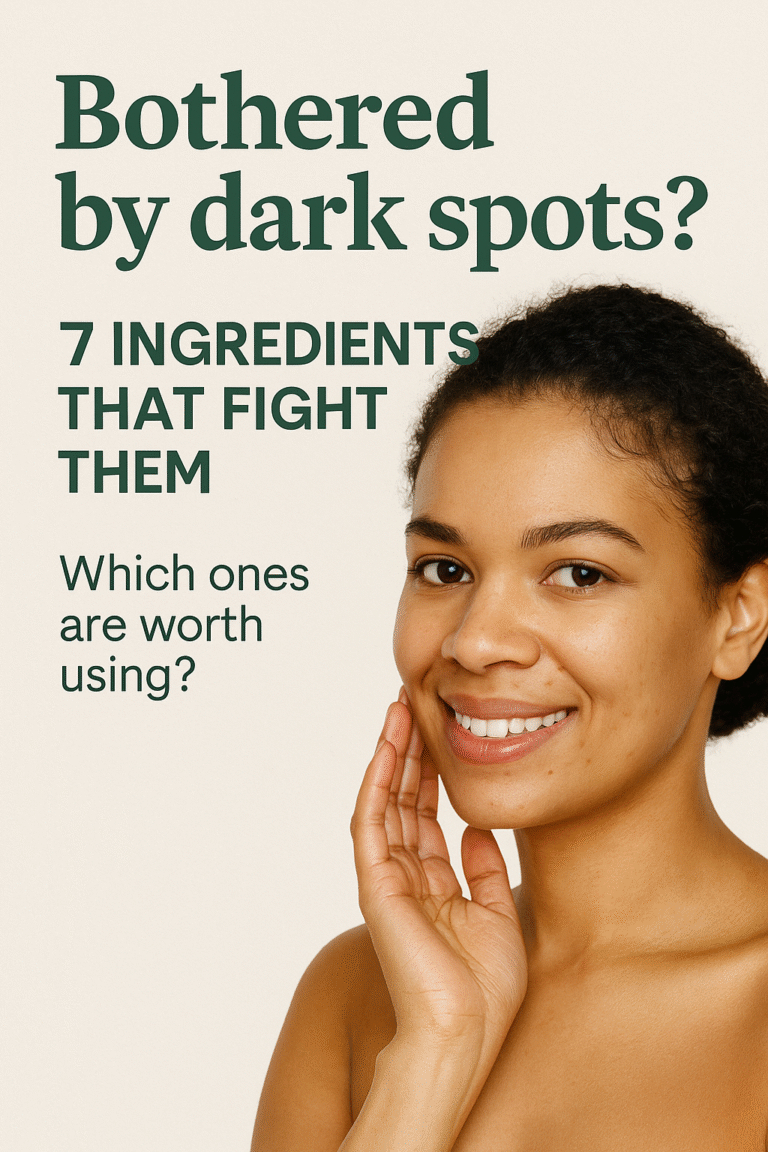
Dark spots, also known as hyperpigmentation, can be a frustrating skin concern for many. Whether they appear due to sun exposure, hormonal changes, acne scars, or aging, these patches of discoloration often seem stubborn and hard to fade. Fortunately, science has identified several potent ingredients that can help diminish dark spots and improve overall skin tone.
In this comprehensive guide, we'll explore 7 ingredients that fight dark spots like a pro and how to incorporate them into your skincare routine for glowing, even-toned skin.
1. Niacinamide
What it is: A form of Vitamin B3, niacinamide is a multitasking powerhouse widely used in skincare.
How it works: Niacinamide helps reduce inflammation, improve skin barrier function, and fade hyperpigmentation by inhibiting the transfer of melanin to skin cells.
Scientific Backing: Studies show that using niacinamide at concentrations of 5% can significantly lighten dark spots and improve skin brightness within 4-8 weeks.
Best For: All skin types, especially sensitive or acne-prone skin.
Pro Tip: Look for serums or moisturizers that contain at least 5% niacinamide.
2. Vitamin C (Ascorbic Acid)
What it is: A potent antioxidant that protects against oxidative stress and promotes collagen production.
How it works: Vitamin C inhibits melanin production and brightens the skin, helping to reduce the appearance of dark spots and sun damage.
Scientific Backing: Multiple clinical trials confirm its effectiveness in reducing pigmentation and improving skin texture.
Best For: Dull, uneven skin tone and sun-damaged skin.
Pro Tip: Use a stabilized form of Vitamin C (like magnesium ascorbyl phosphate) for less irritation and better shelf life.
3. Retinol (Vitamin A)
What it is: A derivative of Vitamin A, retinol promotes skin cell turnover and regeneration.
How it works: Retinol speeds up cell renewal, fading dark spots over time by bringing fresh, even-toned skin to the surface.
Scientific Backing: Dermatologists agree retinol is among the most effective ingredients for treating hyperpigmentation and fine lines.
Best For: Mature skin, uneven texture, and acne-related dark spots.
Pro Tip: Start with a low concentration (0.25% or 0.5%) to build tolerance.
4. Alpha Arbutin
What it is: A naturally derived compound from the bearberry plant, alpha arbutin is a gentle skin brightener.
How it works: It inhibits the enzyme tyrosinase, which plays a critical role in melanin production, thus helping to reduce dark spots.
Scientific Backing: Known for being as effective as hydroquinone without the harsh side effects.
Best For: Sensitive skin and individuals looking for a gentle alternative to strong bleaching agents.
Pro Tip: Use alpha arbutin daily under sunscreen for maximum benefits.
5. Kojic Acid
What it is: A by-product of fermented rice, used extensively in Asian skincare.
How it works: Kojic acid blocks tyrosinase and prevents melanin formation, leading to a visible reduction in dark spots.
Scientific Backing: Studies suggest regular use can improve sun spots, melasma, and acne scars.
Best For: Stubborn pigmentation and uneven tone.
Pro Tip: Combine kojic acid with glycolic acid for better penetration and effectiveness.
6. Tranexamic Acid
What it is: A synthetic derivative of the amino acid lysine.
How it works: It reduces the interaction between melanocytes and keratinocytes, effectively interrupting the skin’s pigmentation process.
Scientific Backing: Dermatologists recommend it as a topical treatment for melasma and persistent dark spots.
Best For: Hormonal pigmentation and melasma-prone skin.
Pro Tip: Look for products that combine tranexamic acid with niacinamide or Vitamin C for a synergistic effect.
7. Azelaic Acid
What it is: A naturally occurring acid found in grains like barley and wheat.
How it works: It targets inflammation and melanin production, making it ideal for post-inflammatory hyperpigmentation.
Scientific Backing: Frequently prescribed by dermatologists for acne and pigmentation, especially in rosacea patients.
Best For: Acne-prone skin, rosacea, and post-acne dark spots.
Pro Tip: Use azelaic acid consistently as part of your morning routine for clear, even skin.
How to Choose the Right Ingredient for You
Your skin is unique, and so are its needs. Here are a few tips to guide your selection:
For sensitive skin: Start with niacinamide or alpha arbutin.
For acne-prone skin: Azelaic acid and retinol work well.
For sun spots and melasma: Consider tranexamic acid and kojic acid.
For overall brightness: Vitamin C is your go-to.
Essential Skincare Tips for Best Results
Consistency is key. These ingredients work over time. Stick to your routine for at least 6–8 weeks.
Always wear sunscreen. UV exposure worsens dark spots and diminishes the effectiveness of treatments.
Avoid combining too many actives. This can irritate the skin. Introduce one ingredient at a time.
Hydrate and moisturize. A healthy skin barrier aids in better ingredient absorption.
Final Thoughts
Fading dark spots doesn’t have to be a frustrating, never-ending battle. With the right ingredients, backed by science, you can reclaim clear, radiant skin. Whether you’re dealing with sun spots, acne scars, or hormonal pigmentation, these 7 ingredients offer safe and effective solutions.
✅ Start with one of the recommended ingredients today and notice the transformation in a few short weeks.
🔗 Looking to get rid of Hyperpigmentation Naturally? Check out our recommended Natural skincare product and begin your journey to clearer skin.
📢 Have questions or want personalized advice? Drop a comment below or share this article with someone who needs it!
